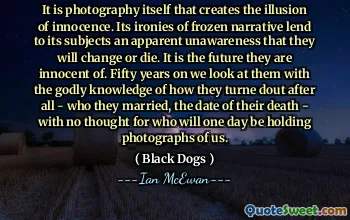
It is photography itself that creates the illusion of innocence. Its ironies of frozen narrative lend to its subjects an apparent unawareness that they will change or die. It is the future they are innocent of. Fifty years on we look at them with the godly knowledge of how they turne dout after all - who they married, the date of their death - with no thought for who will one day be holding photographs of us.
In Ian McEwan's "Black Dogs," the author explores the nature of photography and its ability to capture moments in a way that creates a sense of innocence. This illusion stems from the way photographs freeze time, presenting subjects as unaware of the inevitable changes and endings that life brings. The stillness of the image contrasts with the reality of aging and mortality, emphasizing how we often view these captured moments with a profound sense of knowledge about the future lives of those depicted in the images.
As viewers, we possess insights about the subjects—who they married, when they passed away—while neglecting to consider how future generations will perceive us through our own photographs. This reflection raises questions about legacy, memory, and the fleeting nature of life, highlighting a disconnect between the present captured in photos and the eventual narrative that unfolds. McEwan invites readers to ponder the complexities of memory and the stories we leave behind, intertwined with the simple, yet powerful act of photography.

